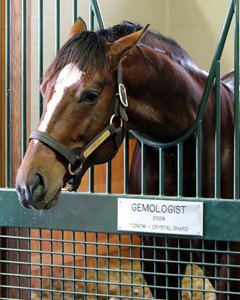Louisiana-Bred Program Changes Bylaws to Grow Foal Crop


The Louisiana Thoroughbred Breeders Association's board of directors made two bylaws changes last week it hopes will make the state's breeding incentive program more attractive to breeders outside its borders and bolster the population of accredited Louisiana-bred foals.
One change allows resident Louisiana mares to be bred to a stallion outside the state for consecutive years and still permits the resulting foals to become accredited Louisiana-breds. Previously, breeders could send a mare to an out-of-state stallion, but that foal could not be an accredited Louisiana-bred unless the mare was bred back to a Louisiana-based stallion.
Under the new rule, breeders may have access to better stallions, but the resulting foals by out-of-state stallions will be eligible to receive half of any breeder's award incentive money. A Louisiana-bred foal by a Louisiana-registered stallion is eligible to receive full breeder's awards, which are 20% of total purses earned for horses that finish 1-2-3 in any race in Louisiana or 1-2-3 in any stakes race outside Louisiana (purse capped at $200,000).
The other change applies to nonresident mares being bred to Louisiana stallions. They now only need to remain in Louisiana for 90 days or at least until Aug. 1 and then can be returned to an out-of-state breeder's farm until they get close to foaling. Prior to the rule change, a mare would have had to stay in Louisiana and deliver her Louisiana-sired foal for it to be eligible as a Louisiana-bred.
"We were losing mares every year because our residency requirements were keeping them here way too long," said David Tillson, who stands stallions at Acadiana Equine at Copper Crowne, which stands Court Vision and Gemologist . Tillson also was elected to the LTBA board in June. "Now they can be bred to a Louisiana stallion and go back home after 90 days. I think this will stimulate our stallion business significantly, and this gives us the opportunity to create more Louisiana-bred foals and fill more Louisiana-bred races."
The rule change that allows Louisiana mares to be bred to out-of-state stallions without having to breed to a Louisiana sire every other year is the most controversial of the changes.
"I have always been a proponent of going out whenever you want to," said Tom Early, an LTBA board member and former CEO for the LTBA. "We did this back in the '90s, and it stimulated a big influx of better quality mares into the state. We had some objections from the stallion owners, but in the long run a lot of those mares ended up being bred to the local stallions, and it helped them, too."
Early used as an example the grade 1-winning Louisiana-bred mare Happy Ticket, who was bred and raced by Stewart Madison.
"The owner of that mare left her in Kentucky after she retired because she made a lot of money and he didn't want to breed that mare to a $25,000-$30,000 stallion in Kentucky and then have to breed her to a $2,500-$3,500 stud fee horse in Louisiana," Early said. "That devalues his mare."
Under the rule change, Happy Ticket could be bred to a stallion in Kentucky, and as long as she is back in Louisiana 90 days after her cover or by Aug. 1, her foal is eligible to be a Louisiana-bred.
Jay Adcock, who stands 11 stallions at his Red River Farm near Coushatta, said he firmly believes these changes—particularly the change allowing breeders to use out-of-state stallions—will hurt Louisiana stallion farms.
"If you have the intention of breeding and raising horses for the commercial market, then this rule is going to force you to breed out of state," said Adcock, whose roster includes Mo Tom, Tom's Ready, and Sum of the Parts. "Am I going to bring in any more stallions? I'll have to think hard about that."
Adcock said the previous rule requiring breeding a mare every other year to a Louisiana sire went a long way toward not only supporting the local stallions but also giving opportunities to breeders who don't have the resources to breed their mares out of state, many choosing to go to Kentucky stallions.
According to Adcock, about 30% of the Louisiana-bred foals are by out-of-state stallions but represent about half of the state-bred horses finishing 1-2-3 in stakes races. The new rule is likely to grow the percentage of out-of-state-sired state-breds and make it even tougher for Louisiana-sired horses to compete. If a local breeder cannot afford to send his mares out of state and faces tougher competition in races designated for Louisiana-breds, then he's likely to just get out of the business, Adcock predicted.
Adcock also doesn't see the change in residency requirements for nonresident mares being a big draw for Louisiana, either.
"I'll wait to see the numbers, but I just don't see this as a plus," he said. "We have a really good year-round racing program right now, but with the foal crop down, we're barely hanging on. If our foal crop drops more, tracks could start cutting dates, and then Louisiana is done."

Val Murrell with Clear Creek Stud, which has a roster of six stallions that includes multiple Louisiana champion Star Guitar , sees these rules changes actually growing the state's foal crop. Murrell also serves on the LTBA board of directors.
"These changes should have been made some time ago," Murrell said. "The numbers are down, and that is, of course, a national trend, but we need numbers to protect racing days. We are inviting economic growth opportunities and also being helpful to our neighbors. This may be a Band-Aid at this point, but any improvement is better than what we have now. I believe this will be a benefit."
